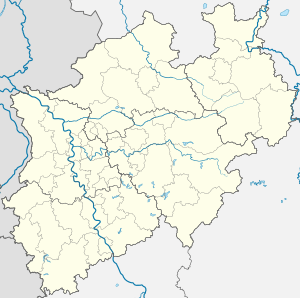Borken, North Rhine-Westphalia
Borken is a town and the capital of the district of the same name, in North Rhine-Westphalia, Germany.
Borken | |
|---|---|
_COA.svg.png) Coat of arms | |
Location of Borken within Borken district   | |
 Borken  Borken | |
| Coordinates: 51°50′N 6°52′E | |
| Country | Germany |
| State | North Rhine-Westphalia |
| Admin. region | Münster |
| District | Borken |
| Subdivisions | 12 |
| Government | |
| • Mayor | Mechtild Schulze-Hessing (CDU) |
| Area | |
| • Total | 152.6 km2 (58.9 sq mi) |
| Population (2018-12-31)[1] | |
| • Total | 42,530 |
| • Density | 280/km2 (720/sq mi) |
| Time zone | CET/CEST (UTC+1/+2) |
| Postal codes | 46325 |
| Dialling codes | 02861 |
| Vehicle registration | BOR |
Geography
Borken is situated 10 km east of the Dutch border. Borken station is the northern terminus on the remaining section of the Gelsenkirchen-Bismarck–Winterswijk railway.
Division of the town
Borken consists of 12 districts:
|
|
The 10 largest groups of foreign residents by 31.12.2018 :
| 627 | |
| 408 | |
| 262 | |
| 154 | |
| 145 | |
| 121 | |
| 118 | |
| 110 | |
| 85 | |
| 79 | |
History
The name comes from the German word "Burg" or "Burk" and gradually changed to "Burke", then "Burken" and finally to "Borken". Around the year 800 the village was being used by Charles The Great (Charlemagne) as a stopover place on his travels. In 1226 City rights were granted by Bishop Dietrich II of Isenberg-Limburg. Fortification of the city with walls and towers was first noted in 1391.
In the last years of the Holy Roman Empire (1803–06) it was the capital of the short-lived principality of Salm. From 1810 to 1814 it was part of the French Empire. In 1815 Borken came under the jurisdiction of the Prussian Province of Westphalia. At the same time it became the seat of government for the newly formed district or county of Borken (Kreis Borken). Between 1880 and 1905 the area experienced the building of railroad connections: (1880 Wanne-Borken-Winterswijk line, 1901 Empel-Bocholt-Borken and Borken-Burgsteinfurt, 1905 Borken-Coesfeld-Münster).
Near the end of World War Two the historic center of the city was heavily destroyed. After the war, community rearrangements followed in 1969, including annexation of Gemen and other towns in the vicinity. Between 1975 and 1978 came the cleaning up and rebuilding of the southern part of the old city. There, buildings which had outlasted the destruction of the Second World War were finally demolished. In 2001 Borken celebrated its 775th anniversary.
Gallery
 Borken, church: Propsteipfarre Sankt Remigius
Borken, church: Propsteipfarre Sankt Remigius Borken, tower: der Kuhmturm
Borken, tower: der Kuhmturm Borken, sculpture at den Markt
Borken, sculpture at den Markt Weseke, catholic church: Pfarrkirche Sankt Ludgerus
Weseke, catholic church: Pfarrkirche Sankt Ludgerus Weseke, windmill: die Bockwindmühle
Weseke, windmill: die Bockwindmühle Gemen, church: die Johannes Kirche
Gemen, church: die Johannes Kirche Burlo, monastery: Kloster Mariengarden
Burlo, monastery: Kloster Mariengarden Borkenwirthe, panorama near Weddingesch-Baulo
Borkenwirthe, panorama near Weddingesch-Baulo
Twin towns - sister cities
Borken is twinned with:[2]






Notable people
Born in Borken
- Otto Leopold of Limburg Stirum (1684–1754), Lord of Gemen and Raesfeld, General of the Imperial Army
- Ilse von Stach (1879–1941), writer
- Jacques Palminger (born 1964), musician
- Marvin Grumann (born 1993), footballer
- Cornelia "Coco" Maaßen (born 1999), handballer
Connected with Borken
_-_1914_-_Ritratto_da_Leon_Bakst.jpg)
- Léonide Massine (1896–1979), dancer and choreographer, died in Borken
- Herbert Lütkebohmert (1948–1993), footballer, lived in Borken and is buried here
- Marcus Ehning (born 1974), jumping rider, lives in Borken-Weseke
References
- "Bevölkerung der Gemeinden Nordrhein-Westfalens am 31. Dezember 2018" (in German). Landesbetrieb Information und Technik NRW. Retrieved 10 July 2019.
- "Partnerstädte". borken.de (in German). Borken. Retrieved 2019-11-27.
External links
- Official site (in German)
- Heraldry of Borken